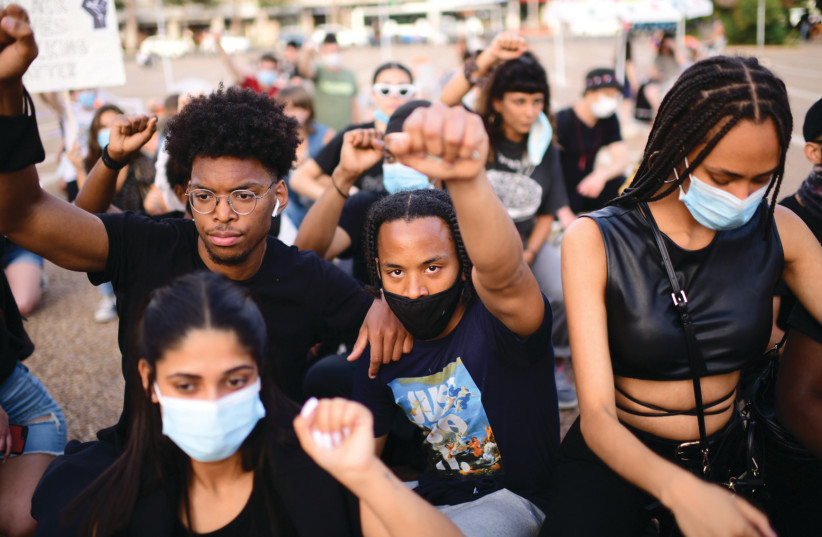The contract of anti-racism czar Aweke Kobe Zena was not continued by Regional Cooperation Minister David Amsalem last Thursday, a decision according to activists influenced by a Noam party blacklist and Zena’s work exposing anti-Arab racism in addition to other strains of hate.
Zena was appointed to head the Justice Ministry’s anti-racism unit in 2016 with a six-year contract and two additional optional years.
According to former Justice Ministry director-general Emi Palmer, Zena was notified that he wouldn’t be continuing in the position two days before he was supposed to meet with Amsalem on the matter.
While she said it was in the minister’s right to decide Zena wasn’t the right person for the job, the manner in which it was done didn’t show goodwill. Zena’s contract is now set to expire in the coming weeks.
The process of Zena’s dismissal “shows the face of the government: that the issue of racism doesn’t interest them,” said Ethiopian community social activist Avi Yalew.
Possible Noam party blacklist
Activists told The Jerusalem Post it is suspected that Zena’s contract was not renewed in connection to a Noam party blacklist. The 2019 documents, published by Yediot Ahronot in 2022, detailed the names and affiliations of LGBTQ+ persons in media, feminist academics, and other figures in the Education and Justice ministries.

The list included Zena by name, according to human rights activist Dr. Shula Mola. She said he was included because he spoke for justice and against racism – including for Arabs.
A spokesperson for Amsalem said that the position had expired, having been a period of six years in line with other fixed-tenure office holders. Mola dismissed this as an excuse, as the minister didn’t even deign to meet with Zena.
“Attorney Aweke ends his position completing the set period and after the ministry worked to extend his service for an additional half a year,” said Amsalem’s spokesperson. “The ministry intends to fill the position as soon as possible.”
Anti-Ethiopian racism is a major concern
YALEW SAID there was concern that the government would appoint a “yes man” who wouldn’t seriously forward the struggle against racism, adding that Aweke didn’t close his eyes to problems the government would prefer to ignore. Mola expressed concern that Amsalem would promote someone who would be selective in their work.
“He thinks that you can only fight racism against Ethiopians and Mizrahim?” asked Mola. She said that there was no such thing as being half against racism.
Yalew explained that “Kobi fighting against racism against Arabs probably didn’t help his position with people in the government.”
Palmor explained that the anti-racism unit had tackled racism and discrimination across Israel’s cleavages. The unit had its origins in the 2015 protests by the Ethiopian community against systemic discrimination, in particular that by the police.
Prime Minister Benjamin Netanyahu had sanctioned the formation of the Committee to Combat racism, which Palmer led to produce a report of 33 recommendations. Yalew and Mola were members of the committee.
Out of the recommendations the anti-racism unit had been formed in 2016, and would receive complaints about systemic discrimination in ministries and civil services. Anti-racism advisors were appointed in 70 offices to support the collection. Zena had to build the infrastructure from nothing.
The Palmer report had 17 recommendations to reform police conduct, and the work of the report and the unit decreased the arrest of Ethiopian minors by 20% and incarceration by 80%, said Palmer. However, Zena’s work was not limited to just the Ethiopian community.
“Citizens of all discriminated groups have complained to the unit, including Arabs, Druze, people from the former Soviet Union, and Haredi,” said Palmer. She noted that the Haredi community suffered widespread discrimination during the coronavirus pandemic.
Mola said that the government had created a unit without teeth, and only against anti-Ethiopian racism, but that Zena had worked hard to turn the unit into an effective tool against all discrimination. Without Zena or someone like him, the unit would not have the same relevancy.
Mola said that she was certain that the ending of Zena’s contract was a bid to stop the fight against racism, and the government was moving in the direction of facism by eliminating all tools promoting justice and equality. However, Mola noted that no past government, including Naftali Bennett’s administration, had seriously committed to countering racism.
“The government in general, center, right... all of them are not interested in the fight against racism,” said Mola.
